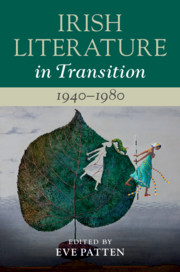Book contents
- Irish Literature in Transition, 1940–1980
- Irish Literature in Transition
- Irish Literature in Transition, 1940–1980
- Copyright page
- Contents
- Contributors
- Series Preface
- General Acknowledgements
- Introduction
- Part I After the War: Ideologies in Transition
- Part II Genres in Transition
- Chapter 5 Intermodernism and the Middlebrow in Irish Writing
- Chapter 6 Transitional Life-Writing: Frank O’Connor and the Autobiographical Tradition
- Chapter 7 ‘Somehow It Is Not the Same’: Irish Theatre and Transition
- Chapter 8 Samuel Beckett, Flann O’Brien and the Literature of Absurdity
- Part III Sex, Politics and Literary Protest
- Part IV Identities and Connections
- Part V Retrospective Frameworks: Criticism in Transition
- Index
Chapter 6 - Transitional Life-Writing: Frank O’Connor and the Autobiographical Tradition
from Part II - Genres in Transition
Published online by Cambridge University Press: 28 February 2020
- Irish Literature in Transition, 1940–1980
- Irish Literature in Transition
- Irish Literature in Transition, 1940–1980
- Copyright page
- Contents
- Contributors
- Series Preface
- General Acknowledgements
- Introduction
- Part I After the War: Ideologies in Transition
- Part II Genres in Transition
- Chapter 5 Intermodernism and the Middlebrow in Irish Writing
- Chapter 6 Transitional Life-Writing: Frank O’Connor and the Autobiographical Tradition
- Chapter 7 ‘Somehow It Is Not the Same’: Irish Theatre and Transition
- Chapter 8 Samuel Beckett, Flann O’Brien and the Literature of Absurdity
- Part III Sex, Politics and Literary Protest
- Part IV Identities and Connections
- Part V Retrospective Frameworks: Criticism in Transition
- Index
Summary
Using Frank O’Connor’s autobiography as an example, this essay assesses more generally the profile of Irish autobiography within the critical retrospectives of the late 1950s and early 1960s, in an Ireland deeply concerned with its own transition to independent adulthood. Autobiographies intentionally blur the distinction between fact and fiction. Semi-autobiographical accounts of a child’s development in a troubled state – a phrase which covers both individual and national conditions – predominated during this period. This essay considers the function of O’Connor’s first and most successful autobiography, An Only Child (1961), as a systematic and comprehensive assault on the nationalist, militarist and masculine regimes of power imposed on the protagonist during his childhood and adolescence. Generally, while O’Connor overtly links his protagonist’s awakening to the emergence of a masculine and hegemonic national self-determination, he also distances himself from this process by privileging the individual over the communal. This manifests itself in a number of revisionist depictions of the revolutionary period, in, for example, exposing the hypocrisy endemic to his fellow interned Republican prisoners in 1923, or his thematic evocation of the male body as a site of metaphoric significance for the broader concept of the Free State’s ‘body politic’.
Information
- Type
- Chapter
- Information
- Irish Literature in Transition, 1940–1980 , pp. 119 - 133Publisher: Cambridge University PressPrint publication year: 2020
